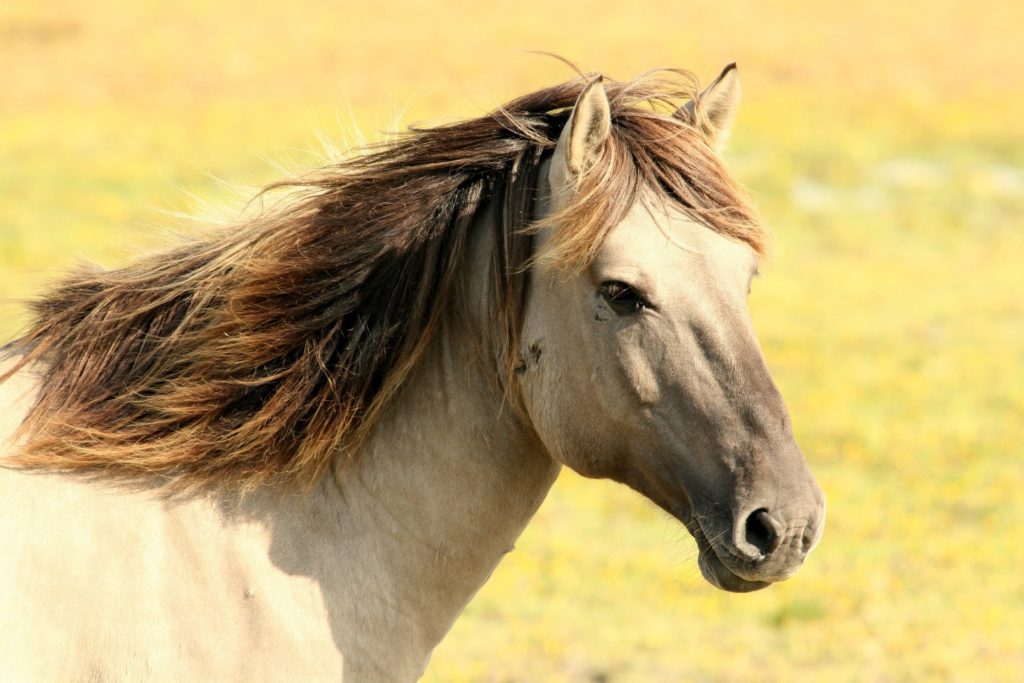- Calls to this hotline are currently being directed to Within Health, Fay or Eating Disorder Solutions
- Representatives are standing by 24/7 to help answer your questions
- All calls are confidential and HIPAA compliant
- There is no obligation or cost to call
- Eating Disorder Hope does not receive any commissions or fees dependent upon which provider you select
- Additional treatment providers are located on our directory or samhsa.gov
Discovering Your Authentic Self in Eating Disorder Equine Therapy

The connection we make with animals can be hugely beneficial for our mental health which is why Equine Therapy can be so helpful in eating disorder treatment.
As I type this, I am sitting with my cat to my left, and even hearing her purr or reaching up to give her head a small pat is relaxing me from my workday and bringing me joy.
Researchers and mental health practitioners are harnessing this powerful connection we have with animals by bringing them into therapy with us. Dogs, cats, goldfish, you name the animal, and I’m sure there is someone that has had it approved for emotional support or therapy.
The effectiveness of animal-assisted treatment varies based on the species and the individual. However, one type of animal-assisted treatment that is impressively effective with many populations is equine therapy.
Through connecting with horses, individuals connect with themselves.
In Equine Therapy, Horses Can Tell You How You are Feeling
One very telling aspect of interaction with horses is their response to emotional energy. Hallie Sheade, a specialist in equine-assisted therapy, asserted in a 2018 Counseling Today article that horses pick up quickly on emotional energy [1].
In treatment, this can help the therapist gain insight as to what their client is experiencing without them even saying it. Many struggling with disordered eating thoughts or behaviors report feeling “numb,” as if they can no longer connect to their own emotions or trust them.
Learning how a horse responds to specific emotions may help the individual to identify and label those emotions within themselves. For example, an individual may recognize that they are feeling anxious when the horse they are with signals to the herd to leave, as this is their response to anxious energy due to feeling unsafe [1].
Horses Can Help You Recognize your Unhelpful Core Beliefs
We also learn a great deal about the lens we view life through in equine therapy. If the horse behaves in a certain way, it can be very telling how an individual responds to that.
 For example, if it turns its face away from their hand, do they assume that they have done something wrong, that the horse does not like them, or that they are not lovable?
For example, if it turns its face away from their hand, do they assume that they have done something wrong, that the horse does not like them, or that they are not lovable?
This signals that the individual may be looking at their life experiences through the lens of unhelpful and negative core beliefs, which can then be addressed through treatment and self-work.
Equine Therapy Can Heal Your Relationship with Your Body
Riding horses is a very nuanced experience that involves not only noticing and listening to every signal the horse’s body makes but also recognizing the signals that you are sending. It is a partnership where the more you both know your own and one another’s bodies, the smoother the ride, literally.
Working through eating disorder treatment with equine therapy gives individuals an opportunity to get to know their body again and, maybe, change their view on it.
In the throes of an eating disorder, the body becomes loathed and expendable. Any physical experience allowing an individual to connect with their body and use it for joyful and fulfilling experiences heals that relationship.
These are just a few of the ways that adding equine therapy to eating disorder treatment can help those who feel lost and unsure of themselves to connect with their emotions, thoughts, and bodies once again.
Resources:
[1] Meyers, L. (2018). The people whisperers. Counseling Today, 60:7, 24-29.About the Author:
 Margot Rittenhouse, MS, PLPC, NCC is a therapist who is passionate about providing mental health support to all in need and has worked with clients with substance abuse issues, eating disorders, domestic violence victims, and offenders, and severely mentally ill youth.
Margot Rittenhouse, MS, PLPC, NCC is a therapist who is passionate about providing mental health support to all in need and has worked with clients with substance abuse issues, eating disorders, domestic violence victims, and offenders, and severely mentally ill youth.
As a freelance writer for Eating Disorder Hope and Addiction Hope and a mentor with MentorConnect, Margot is a passionate eating disorder advocate, committed to de-stigmatizing these illnesses while showing support for those struggling through mentoring, writing, and volunteering. Margot has a Master’s of Science in Clinical Mental Health Counseling from Johns Hopkins University.
The opinions and views of our guest contributors are shared to provide a broad perspective on eating disorders. These are not necessarily the views of Eating Disorder Hope, but an effort to offer a discussion of various issues by different concerned individuals.
We at Eating Disorder Hope understand that eating disorders result from a combination of environmental and genetic factors. If you or a loved one are suffering from an eating disorder, please know that there is hope for you, and seek immediate professional help.
Published June 16, 2020, on EatingDisorderHope.com
Reviewed & Approved on June 16, 2020, by Jacquelyn Ekern MS, LPC

The EatingDisorderHope.com editorial team comprises experienced writers, editors, and medical reviewers specializing in eating disorders, treatment, and mental and behavioral health.

